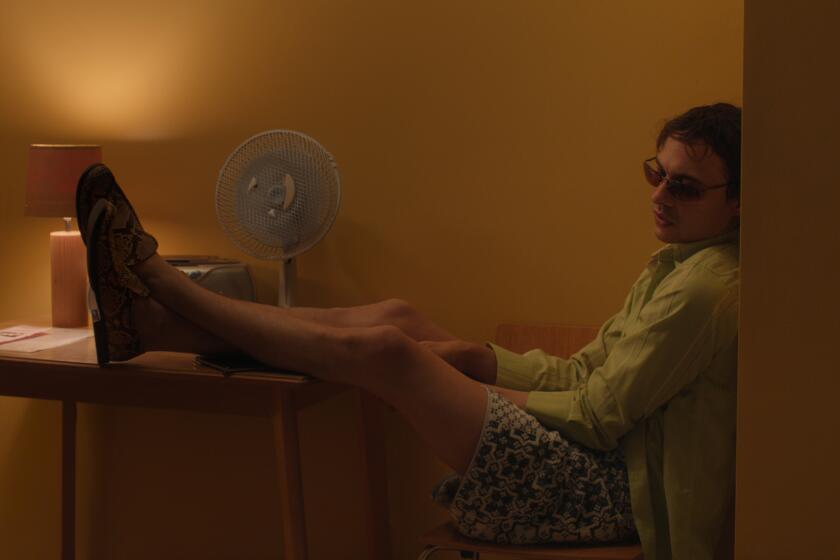Driving Miss Odessa : Civil rights: Rosa Parks calls the film important because the United States has neglected the subject for too long.
- Share via
At Tom Bradley’s birthday party last week, Herbie Hancock, Lionel Richie and Robert Guillaume rushed up to pay their respects to her . At the Century City premiere of “The Long Walk Home,” her name drew as much applause as the film’s stars, Whoopi Goldberg and Sissy Spacek.
These are hardly moments that the 77-year-old Rosa Parks could have imagined 35 years ago, when she refused to move to the back of a bus in Montgomery, Ala., and inadvertently started the Montgomery bus boycott--one of the seminal events of the civil rights movement.
Parks’ literal sit-in in 1955 also provided the dramatic spark for Richard Pearce’s “The Long Walk Home,” the story of a proper Southern matron (Spacek) and her black maid (Goldberg), whose lives are irrevocably transformed by acts of conscience.
The 77-year-old Parks, dressed in a simple beige floral dress for this interview in the Art Deco library of the St. James’s Club on the Sunset Strip, soft-sells her role in history. “Everyone who lives makes history,” she says. “Much of it just isn’t written or made public.”
She was 42, a tailor’s assistant in a local department store when she was arrested for refusing to move to the back of the bus. She never paid her $14 fine, nor did she ride on a public bus again until they were desegregated more than a year later.
There is no Rosa Parks character in “The Long Walk Home,” but news of her arrest sets the dramatic events in motion. In the movie, Spacek’s Miriam Thompson and Goldberg’s Odessa Cotter have the ‘50s version of a Southern master-slave relationship--respectfully distanced--but they become bonded as they are both politicized by the boycott. Eventually, they unite against an angry white mob that includes Thompson’s own husband.
Parks gives the movie a mixed review. She says it’s “a well-written story,” a great improvement as a civil-rights movie over “Mississippi Burning,” “which presented the FBI as heroes, when we knew it was not so.” She calls “The Long Walk Home” an important film because the United States has neglected the subject for too long.
“Young people particularly can learn the lesson that as long as we let race relations stand in the way of humanity, we won’t make the progress we should,” she says.
Still, Parks, who was not consulted on the project, takes issue with certain aspects of the film.
“The tone is right, the events could have happened, but to my knowledge, there were no white women who actually drove in the car pools (organized to assist blacks boycotting the public bus system),” she says. “Also, the mob scene ending was very ‘Hollywood.’ People adamant about harassing blacks wouldn’t have been affected by someone stepping forward to sing a song. They just weren’t Christian enough to fall silent.”
A film about Parks’ life is in development with Magnusfilms, and she hopes it will be more “authentic.” No decision has been made about an actress to portray her, but her own wish list includes Cicely Tyson, Alfre Woodard and Denise Nicholas.
New Visions Pictures and the distributor, Miramax Films, who brought Parks to Los Angeles for the premiere, are loath to debate the merits of the $7-million film with her. However, a New Visions official did respond to her criticism.
“(Spacek’s character) is an amalgam of white men and women who took various actions in support of the boycott,” says Jane Russell, director of marketing. “If white women didn’t drive, then we have documented evidence that white males did. It’s a movie, and the ending was a dramatic choice--a conglomeration of real-life incidents.”
Called the mother of the modern civil-rights movement, Parks has been in the spotlight ever since her arrest. She has spoken at schools and universities, been active in the NAACP and was a staff assistant to Rep. John Conyers (D-Mich.) from 1965 until her retirement two years ago. She is currently at work on three autobiographies--two for children to be published by Dial Press and one for adults for Time-Life Books.
Asked whether she was disheartened by the civil-rights setbacks of the ‘80s, Parks responds: “It is, or can be, discouraging . . . but I refuse to permit myself to feel that all is lost. We have to look at the good that has been accomplished because focusing on the negative is too overpowering.”
More to Read
Only good movies
Get the Indie Focus newsletter, Mark Olsen's weekly guide to the world of cinema.
You may occasionally receive promotional content from the Los Angeles Times.










